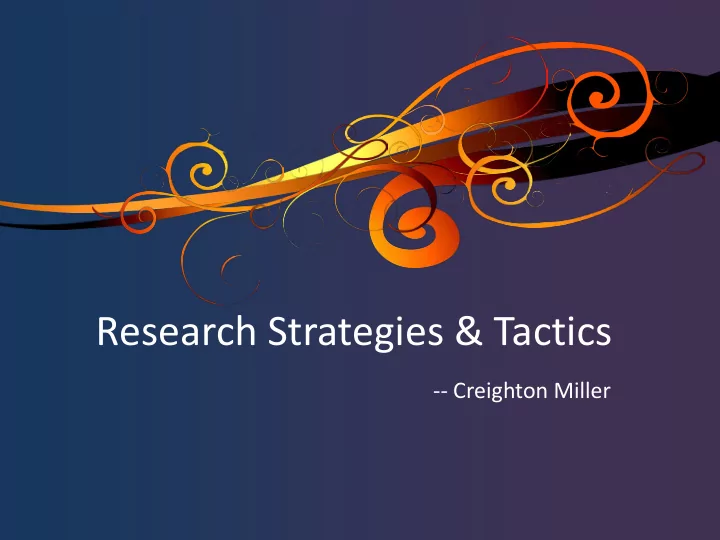

Research Strategies & Tactics -- Creighton Miller
Take-Aways: 1) Research Is a Process 2) Whenever Possible, Cheat!!!! 3) Time Is Money, But So Is Money
Research Is a Process
One Search Does Not Equal Research or The Needle-in-a-Haystack Fallacy “One page from one jurisdiction may be exactly what that attorney is looking for that allows them to win the case. And, if they can't find it, [we] haven't done [our] job.” -- Rick King, Chief Technology Officer for Thompson Reuters (aka “West”) discussing WestlawNext. ( See http://www.geeklawblog.com/2011/08/theres-one-page-in-one-jurisdiction.html)
Research Hypo: P suffered significant injuries in an automobile accident caused by an uninsured motorist. P’s insurance carrier has accepted its liability under P’s uninsured motorist coverage, but refuses to pay that portion of P’s medical expenses that will or should be covered by Medicare. What, if any, recourse does P have against the insurance carrier?
Kinds of Research Complexity Known Fact Concept Issue Item
The Legal Research Process I. Receive Information II. Identify and Analyze Significant Facts III. Formulate Legal Issue(s) IV. Get an Overview of the Subject Area Research Specific Issue(s) VI. Update!
Why Waste Time With an Overview of the Subject Area? • Context & Background – Valuable Details – Overarching concepts – Framework – Avoid “rabbit holes” • Terminology • Citations – Seminal sources
A Taxonomy of Legal Research Sources • Primary Sources • Secondary Sources – “The Law” – “About the Law” • Constitutions • Treatises • Statutes • Legal Encyclopedias • Cases • Law Review Articles • Regulations • Finding Aids – “Tools” • Digests • Indexes • Citators • Search Engines
Potential Sources for Legal Overview Info: • Treatises & Hornbooks – Jurisdiction-specific or General Print or • Legal Encyclopedias Online • (Some) Law Review Articles • Bar Journal Articles • Websites • Digests • People
How Much of an Overview? Overview Needed Complexity Known Fact Concept Issue Item
How Much Information? Find Something Find Everything Characteristics of Useful Information: Authoritative – Credible – Current – Authentic –
Whenever Possible, Cheat!!!!
Stating the Problem Precision: the proportion of relevant documents found to total documents found; a measure of how accurate a search is Recall: the proportion of relevant documents found to relevant documents available; a measure of how complete a search is Precision Recall Maximize Recall = Maximize Precision Minimize Precision = Minimize Recall
Research Strategies Find Everything Find Something
Research Tactics Tactic Difficulty Example “Blind” Search Hard 1) Full-text search on Westlaw/Lexis; 2) Google search; 3) keyword search in a library catalog; 4) use Descriptive Word Index in a West digest Use Finding Aids to Moderate 1) Topic & key number search on find something Westlaw or topic search on Lexis; 2) similar to a source “Similar” search on Google; 3) subject you already have search in a library catalog; 4) use a known topic & key number in a West digest Find citations in a Simple Click on a hyperlink or look up a source source you already by citation have
How To Cheat at Research A Useful Source You’ve Already Found Tools in Sources Indexing Tools • Citations • Digests • Cross-References • Library Catalogs • Annotations • Indexed Databases • Other Finding Aids Other Useful Sources
Read Background/Overview Information about General Legal Topic(s) Search for Statutes or Administrative Search for Case Law Addressing Issue(s) Regulations Addressing Issue(s) • Cites in background sources • Cites in background sources • ALR annotations • Westlaw or Lexis search • Westlaw or Lexis search • Indexes to codes (USC, CFR, state • Print Digests codes, state administrative codes) Note relevant cases, Read the Statutes or Regulations statutes or regulations Read the Cases • Use annotated version for cross- • Print Reporters cited or cross-referenced references and case annotations • Westlaw or Lexis in these sources . • Web sources Find Interpretive Cases • Case annotations Find Similar Cases • Shepards’ or Keycite • Topic & key number system (digests or • Cites in secondary sources Westlaw) • “More Like This” function on Lexis Find Relevant Legislative History • Shepards’ or Keycite • Note: Minimal or no legislative history is available for many states Validate and Update All Sources • Shepards’ or Keycite Use secondary sources for explanation or • Check ALL cases, statutes and regulations interpretation of unclear or complicated law Stop When: Use cases from other jurisdictions and secondary • You find the “answer” sources for cases of first impression, when jurisdictional • You are only cites to things authority is weak, or to argue for change in the law you’ve already read
The Value of Human Indexing Or Why Reinvent the Wheel? • Library Cataloging http://topekalibraries.info/search~S3 • Topic & Key Number System http://lawschool.westlaw.com/shared/westlawRedirect .asp?appflag=71.1&task=keynumber
Time Is Money, But So Is Money
Time Is Money… • Average Billing Rates, Large Firms, 2009 (National Law Journal survey) – Partners: $457/hr. – Associates: $287/hr. • Billable Hours • Write-offs
Efficient Use of Sources • Know Your Sources • Use What’s Available • Prepare • Think Strategically • Use Expensive Tools When Appropriate—but Don’t Get Addicted
Money Is Also Money • Westlaw Pricing Guide for Private Price Plans (April 2010) • WestlawNext Pricing Guide for Commercial Plans
Recommend
More recommend